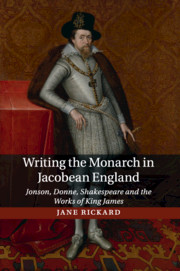Book contents
- Writing the Monarch in Jacobean England
- Writing the Monarch in Jacobean England
- Copyright page
- Contents
- Book part
- Note on texts
- Glossary
- Introduction
- Part I James, Jonson and the Jacobean Court
- Chapter 1 ‘Best of kings’ and ‘best of poets’?: James, Jonson and constructing the role of court poet
- Chapter 2 The ‘abortive and extemporal din’: James, Jonson and the discussion of state affairs
- Part II James, Donne and the Politics of Religion in Jacobean England
- Part III James, Shakespeare and the Jacobean Theatre
- Select bibliography
- Index
Chapter 2 - The ‘abortive and extemporal din’: James, Jonson and the discussion of state affairs
from Part I - James, Jonson and the Jacobean Court
Published online by Cambridge University Press: 05 October 2015
- Writing the Monarch in Jacobean England
- Writing the Monarch in Jacobean England
- Copyright page
- Contents
- Book part
- Note on texts
- Glossary
- Introduction
- Part I James, Jonson and the Jacobean Court
- Chapter 1 ‘Best of kings’ and ‘best of poets’?: James, Jonson and constructing the role of court poet
- Chapter 2 The ‘abortive and extemporal din’: James, Jonson and the discussion of state affairs
- Part II James, Donne and the Politics of Religion in Jacobean England
- Part III James, Shakespeare and the Jacobean Theatre
- Select bibliography
- Index
Summary
- Type
- Chapter
- Information
- Writing the Monarch in Jacobean EnglandJonson, Donne, Shakespeare and the Works of King James, pp. 96 - 134Publisher: Cambridge University PressPrint publication year: 2015



